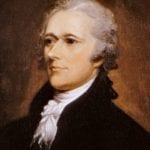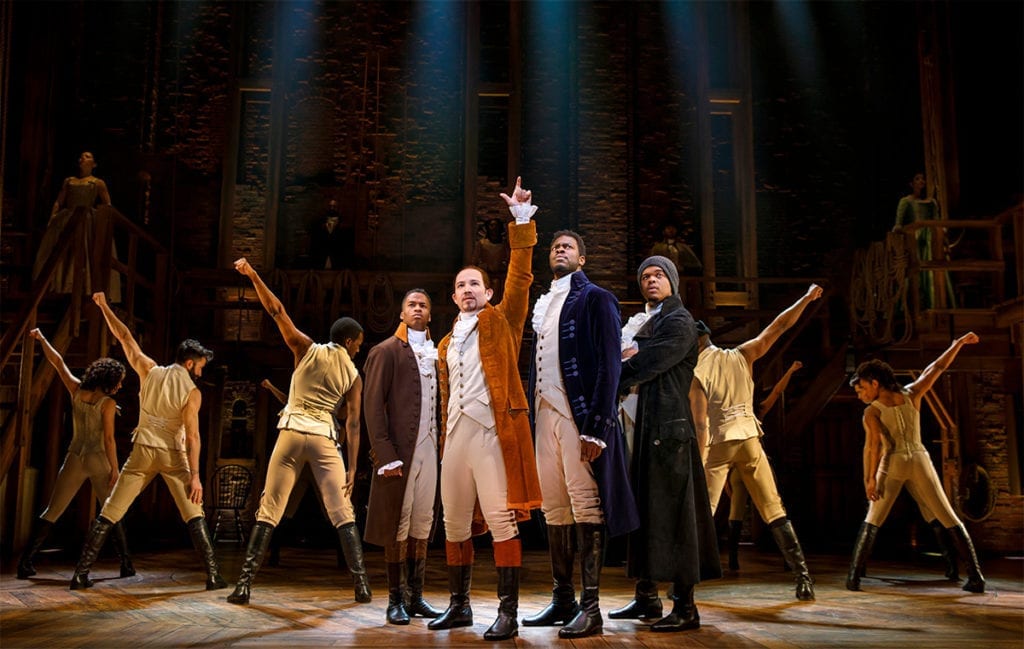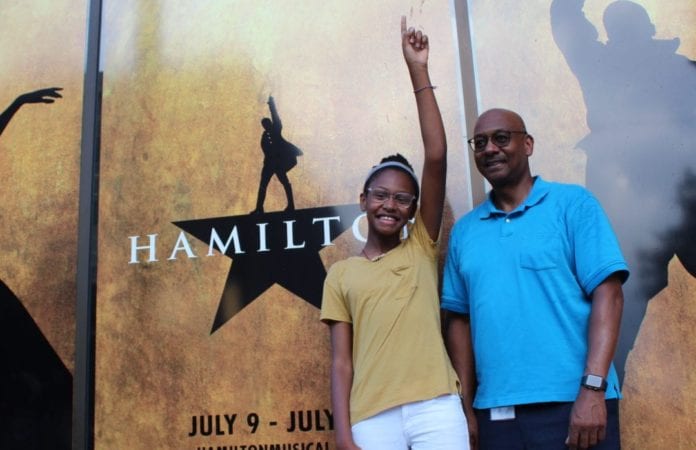“Hamilton” is here. Maybe you’ve heard of it. Brooklyn Cobbige has.
The 12-year-old knew all the songs inside out even though she’d never seen it – before Tuesday night, that is. Her father, Greg, took her to opening night of the hit Broadway musical at the Orpheum as a birthday gift. What does she love so much about it? How about . . . everything?
“All the motifs and how themes are repeated and how it makes you cry,” the tween said on her way into the theatre. “The story is so wonderful. It just really inspires me listening to the soundtrack.”
“Hamilton” has had people raving about it since it debuted on Broadway in 2015. It made its Tennessee premiere Tuesday night in Memphis, the start of a 24-performance engagement at The Orpheum Theatre. The final curtain call will be on Sunday, July 28.
The musical tells the story of Alexander Hamilton, one of America’s founding fathers, an overlooked but fascinating figure in American history who unfortunately may be best known for his pistol duel with Aaron Burr almost exactly 215 years ago, on July 11, 1804. Hamilton died the next day.
The musical has made a household name out of its creator, Tony Award-winner Lin-Manuel Miranda, who chose an ethnically diverse cast to spit rhymes over a musical score heavily influenced by hip-hop. In “Hamilton,” George Washington is still a war hero and still president. But he’s also a black man with some serious lyrical skills on the mic.
“Hamilton has changed the face of American theatre,” said Orpheum Memphis President Brett Batterson. “It took an art form where the melodies and syntax have been largely unchanged since the birth of musical theatre, and it throws some rap, jazz, hip-hop and blues in there. And it challenges the audience to keep up.
“For your average Broadway musical goer, to hear the poetry of rap and hip-hop, it’s a whole new experience,” he added.
But why should you care? More than once while celebrating July 4, I wished my friends a Happy Independence Day, only to be reminded that after signing the Constitution, several founding fathers were greeted by their slaves when they went home.
What can be learned from a musical about that time period? Or for that matter, what difference does it make to have African Americans playing these old white men?
Let’s take a look.
Hamilton – Started from the bottom

First of all, Alexander Hamilton wasn’t born on United States soil.
In fairness, none of the founding fathers were – there was no United States when Hamilton was born in the 1750s. But Hamilton was born on Nevis, about 140 miles south of St. Croix – then known as the West Indies, now known as the U.S. Virgin Islands.
Technically, he was a bastard; his mother was still legally married to another man when Alexander and James were born. And when she died in 1868, a teenage outcast Alexander found himself living and working for a wealthy plantation owner in Christiansted. It was in that up-close-and-personal experience with slavery that Hamilton grew to hate slavery, making him one of America’s earliest abolitionists.
“Who talks most about freedom and equality?” Hamilton wrote. “Is it not those who hold the Bill of Rights in one hand and a whip for affrighted slaves in the other?”
But like so much of America’s history with race, there are nuances. Multiple historians have concluded that Hamilton hated slavery but would yield on the matter if he had something to gain or if he thought it was best for America. Which is part of how we got the legendary “three-fifths” clause in the Constitution – he saw it as the only way for there to be a United States at all.
Obviously, there’s more to Hamilton’s story, and you shouldn’t rely on a Broadway musical or this article to learn it. Brooklyn Cobbige didn’t. Her interest in the musical spurred her interest in the history, and she devoured it hungrily. For instance, she already knows there are historical inaccuracies in the musical. And she now respects the roles that lesser known characters played in the founding of America.
“A bunch of these characters in Hamilton, I don’t know who those people are, I would never know who they are – except for the Hamilton soundtrack,” she said. “It really helps to make history more interesting. And telling it from that kind of hip-hop view really makes you want to know more about what the founding fathers did, and who those people are that never really get mentioned.”
See? Even a 12-year-old can pick up on the nuances of history. For me, there are a few other things that come to mind as I read up on Alexander Hamilton:
First of all, he was a poor kid – an immigrant – raised mostly by a single mom who overcame an extremely difficult childhood to truly make history. If that’s not an American story, I don’t know what is.
Secondly – and I hate how often this gets overlooked – it reminds me that slavery on this continent predates the U.S. You could argue that America was born into slavery as much as any descendant of African slaves.
Hamilton’s story also proves that throughout U.S. history, there have always been people standing against the horrors of slavery. There have always been abolitionists – white people – pushing for America to have integrity when it speaks of freedom and justice for all.
Finally, as tragic as the “Three-Fifth’s Compromise” was, imagine if it never happened. There would be at least two nations on these shores – and eventually the South’s economic might would have made it the dominant nation on the continent.
In other words, without that compromise, we might still be living as slaves. And without Alexander Hamilton, the compromise doesn’t happen.
Interested in Hamilton yet?
Represent, represent

Can you imagine Lin-Manuel Miranda pitching his idea for a musical to Broadway producers?
I want to do a musical about this founding father – not George Washington or Thomas Jefferson, but this other guy. And I want to do it with nonwhite actors and I want to have them rapping.
“They must have thought he was crazy,” Batterson chuckled. “But he felt that there was something there that America can relate to. And he was right.
“It’s genius,” he added. “Pure genius.”
It also refreshed what people think of when they hear the phrase “musical theatre.”
“One thing it’s doing for us is that it’s bringing in newer and younger audiences,” he said. “For us, as an art form, it’s fantastic. These people come to Hamilton, all of a sudden we have new fans – people who may go see Phantom of the Opera or The Book of Mormon.”
And don’t underestimate the power of a black George Washington.
“The fact that you can do (this play) with a diverse cast, it does speak to how far we’ve come, but it doesn’t mean we’ve come as far as we need to,” said Courtney Knowles, who took her 15-year-old daughter to opening night. “It shows that we as a country are open to things being better, and being more diverse.”
Batterson agreed.
“When you talk about the casting, people can now play roles that they traditionally wouldn’t have been considered for before,” Batterson said. “Now, it’s normal, but Hamilton opened the doors for casting decisions that even five years ago, people might have questioned.”
Something to think about
As times change, context changes also. The debut of “Hamilton” during the Obama Administration appeared as another step toward a post-racial society. But as America asks itself tough questions because of President Donald Trump, does Hamilton resonate any differently?
“The story doesn’t change,” Batterson said. “In my own opinion, there are people watching this through a different lens, maybe taking sides a little more.But what’s interesting is that the show succeeds across the nation, regardless of political leaning.
“Good theatre – great theatre – makes us think,” he added. “It makes us want to talk about it afterwards. I can’t guess what people will be saying when they leave the show. But if they’re talking about it on the way home, it was great theatre.”
So . . . what did Brooklyn and Greg Cobbige talk about on the way home?
“Oh, we definitely talked about the show – from The Orpheum all the way back to the car,” Cobbige said the next day via phone. “There was a lot going on, with the music and movement. It definitely kept you engaged. There were no dull moments.”
Did it live up to Brooklyn’s expectations? Was that even possible?
“Brooklyn thought that this Hamilton, as opposed to the excerpts she’s seen online, didn’t seem as passionate as the original cast,” Greg said. “But she was blown away.”




